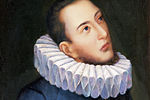Room 36--Gesualdo, the fascinating!
 The Don himself!
The Don himself!
Don Carlo Gesualdo was born in 1561 and he became one of history's most notorious individuals, and not perhaps because of his music, but... He was the duke of a small town, Venosa. When his elder brother died, it was up to Carlo to produce an heir. He ended up marrying a cousin, Donna Maria d’Avalos in 1586. Marrying one’s cousin was quite common in the Italian gentry as it consolidated the wealth of the family rather than dispersing it. Futhermore the marriage was not for love but procreation. A son was required to continue the line.
Donna Maria was probably one hot number. She had already been widowed twice before the age of thirty, having been first married at the age of fifteen, and importantly, had already produced two children so was demonstrably fertile (she is also claimed to have been beautiful and charming). The requisite son, Don Emmanuele, was rapidly produced and within a couple of years the Prince had lost interest in her returning to his young men and music.
It is indeed unfortunate to "lose" three husbands when you are still a young and highly sexual Princess (her first husband, Frederigo, was supposed to have died from too much activity in the bedroom) and it was only to be expected that within a short space of time she would find a new love-interest in the form of young Don Fabrizio Carafa, Duke of Andria, himself married and father to four children. She and the Duke carried on for about two years, until Gesualdo's uncle spilled the beans (or at least some of them).
The Duke suggested to Donna Maria that they might give it a rest so that they wouldn't be discovered. She replied that their love was so hot that she didn't care if Carlo found out. She decided she would rather die for love. Carlo hatched out a plot worthy of Erle Stanley Gardner. He decided he would go hunting with some relatives who lived some fifty miles away from his castle. He and some of the "hard guys" came back in the middle of the night, and just as you might have it in some ancient version of The Sopranos, broke down Donna's bedroom door and whacked (well uh, stabbed) the unfaithful wife and her lover.
Wait! Isn't this a story about music? Oh, I almost forgot. Carlo got off the hook because it was a crime of passion, but the music he wrote took a sudden right turn and his compositions began to anticipate works that wouldn't be heard for two more centuries. Remember how we commented several rooms back that a conservative example of harmony might be what you would find in a church hymnal. Listen to this work from Gesualdo's Sixth Book of Madrigals--Mille volto il di moro. The harmonic progressions are quite astounding and sound very contemporary. Listen for the cadence on a 9th chord at about 1:42 and the concluding descent of a tritone in the soprano on the very last chord. It's rather chilling!
Listen!
Return to classroom.
If you need to leave, Go to initial page of site.
